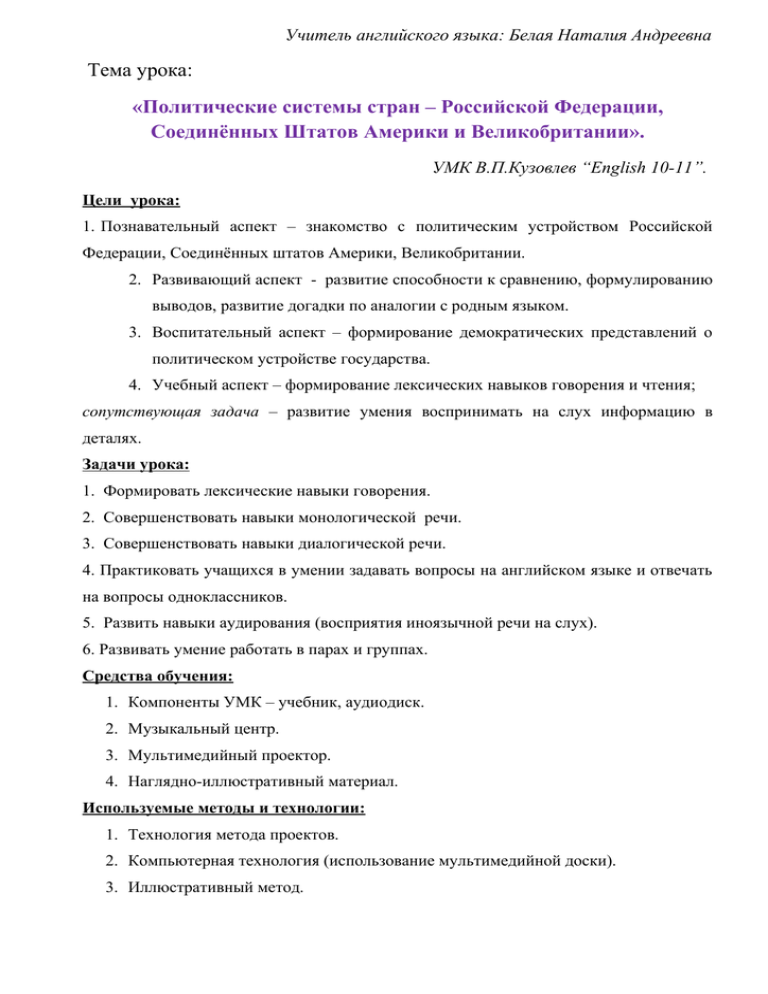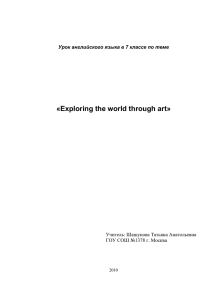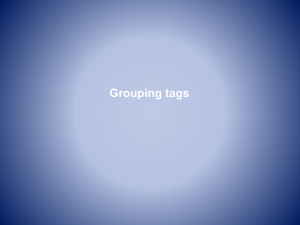Тема урока: «Политические системы стран – Российской
advertisement

Учитель английского языка: Белая Наталия Андреевна Тема урока: «Политические системы стран – Российской Федерации, Соединённых Штатов Америки и Великобритании». УМК В.П.Кузовлев “English 10-11”. Цели урока: 1. Познавательный аспект – знакомство с политическим устройством Российской Федерации, Соединённых штатов Америки, Великобритании. 2. Развивающий аспект - развитие способности к сравнению, формулированию выводов, развитие догадки по аналогии с родным языком. 3. Воспитательный аспект – формирование демократических представлений о политическом устройстве государства. 4. Учебный аспект – формирование лексических навыков говорения и чтения; сопутствующая задача – развитие умения воспринимать на слух информацию в деталях. Задачи урока: 1. Формировать лексические навыки говорения. 2. Совершенствовать навыки монологической речи. 3. Совершенствовать навыки диалогической речи. 4. Практиковать учащихся в умении задавать вопросы на английском языке и отвечать на вопросы одноклассников. 5. Развить навыки аудирования (восприятия иноязычной речи на слух). 6. Развивать умение работать в парах и группах. Средства обучения: 1. Компоненты УМК – учебник, аудиодиск. 2. Музыкальный центр. 3. Мультимедийный проектор. 4. Наглядно-иллюстративный материал. Используемые методы и технологии: 1. Технология метода проектов. 2. Компьютерная технология (использование мультимедийной доски). 3. Иллюстративный метод. Ход урока: 1. Организационный момент. В начале урока звучат гимны Российской Федерации, США, Великобритании. Teacher: Good afternoon! I m happy to see you! We have begun our lesson with the national anthem of different countries. The life of citizens depends on the political system of the state. I’ m sure that every citizens has to know everything about it. That’s why our theme today is “Political systems of the world”. Today we will talk about the main parts of different political systems. You will be divided in to three groups. (В классе заранее сформированы три творческие группы, каждая из которой представляет свою страну): The first group will be politicians from the Russia. The second group will be politicians from the USA. The third will be politicians from the United Kingdom. (На столы групп ставят флаги стран). 2. Фонетическая зарядка: Teacher: Repeat after me, please: [t] – state, minister, constitution, political, politician, government, system; [r] – democracy, country, represent, majority, the Prime-minister, Congress; [w] – branch of power, win, powerful. 3. Речевая зарядка (работа по повторению политических терминов со всеми учащимися): Teacher: Politics is a word that makes us think of different people and activities involved in it. Which words can illustrated the “Political systems and institutions?” (вопрос повторяется учителем несколько раз, пока у учащихся есть варианты ответов): Pupil 1: a monarchy, constitutional monarchy parliamentary democracy, a presidential republic, a federal republic Pupil 2: Parliament, the House of Commons, the House of Lords, the Cabinet, Congress, the House of Representatives; Pupil 3: the Senate, the President's Administration, the Supreme Court; Pupil 4: the Federal Assembly, the Duma; Pupil 5: the Federation Council, the Government of the Russian Federation, the Constitutional Court. Teacher: Which words that illustrated the “Political activities?” (вопрос повторяется учителем несколько раз, пока у учащихся есть варианты ответов): Pupil 6: to revise a bill, to appoint the Prime Minister, to appoint ministers, to determine government policies; Pupil 7: to make laws, to coordinate government departments, to discuss political problems; Pupil 8: to form the Shadow Cabinet, to form the Cabinet, to examine bills; Teacher: Which words can illustrated the “People involved in politics” (вопрос повторяется учителем несколько раз, пока у учащихся есть варианты ответов): Pupil 9: a President, a Prime Minister, the Chairman of the Government, a Senator, a Representative; Pupil 10: a queen, a king, MPs (members of Parliament), a deputy, a minister, a secretary. 4. Повторение лексических единиц на базе интернациональных слов. Teacher: Whether we like it or not but politics is part of our lives. It is everywhere: in newspapers, on the radio and on TV. When we listen to a politician who speaks English we can understand some words without translation. Which word do you know? Pupil 1: a minister Pupil 2: a cabinet Pupil 3: a department Pupil 4: a constitution Pupil 5: a Prime Minister Pupil 6: to coordinate Pupil 7: to control Pupil 8: political Pupil 9: a president Pupil 10: a monarch Pupil 1: a policy Pupil 2: democratic Pupil 3: Duma Pupil 4: an opposition Pupil 5: ceremonial Pupil 6: a Parliament Pupil 7: a politician 5. Проверка домашнего задания. Совершенствование навыков монологической речи (учащиеся защищают свои творческие проекты). Teacher: Your main task was to prepair the projects. Now, please, protect your project. must go to the blackboard and talk about “The Political Systems of your country”. You Group 1 (Russia) представляет свой проект (показ презентации) Group 2 (Great Britain): представляет свой проект (защита плаката) Group 3 (the USA): представляет свой проект (показ презентации) 6. Совершенствование навыков диалогической речи: (работа учащихся в режиме ученик 1 → ученик2, ученик3 → ученик4 и т.д.). Teacher: Now, the representatives of the group “Russia” ask questions about their country and you must answer them (представители группы «Россия» задают вопросы о политическом устройстве своей страны, остальные отвечают): Pupil 1: Who guarantees the basic rights of the people? Pupil 2: The President. Pupil 3: Who elects the members of the Federal Assembly? Pupil 4: The people. Pupil 5: Who appoints the Chairman of the Government? Pupil 6: The President. Pupil 7: Who approves the Chairman of the Government? Pupil 8: The Duma. Pupil 9: Who elects the President? Pupil 10: The people. Pupil 1: Who can dissolve the Duma? Pupil 2: The President. Pupil 3: Who can declare laws unconstitutional? Pupil 4: The Constitutional Court. Teacher: Now, the representatives of the group “Great Britain” ask questions about their country and you must answer them (представители группы «Великобритания» задают вопросы о политическом устройстве своей страны, остальные отвечают): Pupil 1: Does the government represent the legislative branch of power? Pupil 2: No, the government doesn’t represent the legislative branch of power. The government represents the executive branch of power. Pupil 3: Does the Queen votes on the bills? Pupil 4: No, the Queen doesn’t vote on the bills. The Queen signs the bills. Pupil 5: Does the House of Lords has the power to delay bills for one year? Pupil 6: Yes, the House of Lords has the power to delay bills for one year. Pupil 7: Does the Cabinet Ministers revise bills from Parliament? Pupil 8: No, the Cabinet Ministers doesn’t revise bills from Parliament. The Cabinet is responsible for government policies. Pupil 9: Does the Cabinet coordinate the work of the government departments? Pupil 10: Yes, the Cabinet coordinates the work of the government departments. Teacher: Now, the representatives of the group “The USA” ask questions about their country and you must answer them (представители группы «США» задают вопросы о политическом устройстве своей страны, остальные отвечают): Pupil 1: Is the President separate from Congress? Pupil 2: Yes, the President separate from Congress. Pupil 3: Who becomes President? Pupil 4: The person who is elected directly by the people becomes President. Pupil 5: Who is responsible for the departments? Pupil 6: Secretaries are responsible for the departments. Pupil 7: How many houses are there in the USA Congress? Pupil 8: The Congress of the United States is composed of two houses: the Senate and the House of Representatives. Pupil 9: How many members of Senate are there? Pupil 10: There are one hundred members. Pupil 1: Who is the head of the executive branch in the USA? Pupil 2: The President. Pupil 3: Can the people of the USA exercise their power through their representatives? Pupil 4: Yes, the people of the USA can exercise their power through their representatives. Teacher: Thank you. 6. Формирование навыков аудирования (аудиозапись к уроку). Teacher: Now we will listen to the texts about the political systems of Great Britain, USA and Russian Federation. After listening the text you will fill in the table the facts from the text: Текст для аудирования: (Britain is a parliamentary democracy with a constitutional monarch. Queen Elizabeth II is the head of state now but she has no real power. In law the queen is the head of the executive branch and a part of the legislative branch but in fact her role is mostly ceremonial. She acts on the advice of her ministers. In Britain it is Parliament that has the power. Parliament makes laws. It is made up of the House of Lords and the House of Commons. The Commons control the executive branch and discuss most important political problems. The Prime Minister chooses Cabinet and non-cabinet ministers. They are all collectively responsible for government, the executive branch, and individually responsible for their departments. The United States of America is a presidential republic. So, the President is the head of state there. But the President is elected directly by the people and he is not a member of the American parliament, Congress. Congress, the legislative branch of the federal government, is made up of the Senate and the House of Representatives. The President and his Administration represent the executive branch of the federal government. The Russian Federation (Russia) is a presidential republic. The President is the head of state and is elected directly by the people. In fact he has much power. The President can even dissolve the Duma if it doesn't agree with his suggestions three times running. The President has his Administration but it is not part of the Federal Government. The President is involved in the work of the legislative and executive branches. The Federal Assembly represents the legislative branch of power. The Federal Government represents the executive branch of power. The President appoints its head, the Chairman of the Government but the Duma must approve his appointment). Great Britain Political system The head of state The legeslative branch The executive branch The USA Russia The head of the executive Teacher: Now you must go to the blackboard and complete the right information in the table (учащиеся по очереди выходят к доске и заполняют таблицу). Great Britain The USA Russia Political system Constitutional Monarchy, parliamentary Democracy Presidential (Federation) Republic Presidential (Federation) Republic The head of state Queen President President The legeslative branch Parliament Congress Federal Assembly The executive branch The Government The Presidency Federal Government The head of the executive Prime Minister President President 7. Развитие умения переводить (с русского языка на английский) Teacher: Translate my sentences from Russian into English: Субъекты Российской Федерации имеют свои собственные институты власти. Pupil1: Subjects of the Russian Federation have their own institutions of power. Teacher: Глава государства в Британии не избирается прямым голосованием. Pupil2: The Head of the State is not elected directly in Britain. Teacher: Президент и члены Конгресса избираются народом в США. Pupil3:The President and the members of Congress are elected in the USA. 8. Обобщение учебного материала. Teacher: Try to guess the political terms using their definitions (задание написано на доске): 1. To elect (2) 2. An election (3) 1. a person who has the right to vote 2. to choose somebody to vote 3. An elector (1) 3. choosing or selection by vote Pupil 1: To elect – to choose somebody to vote; Pupil 2: An election – choosing or selection by vote; Pupil 3: An elector – a person who has the right to vote. Teacher: Look at these posters, please. (На доске постеры с информацией о прошедших выборах в Калининском районе): Teacher: Do you know what campaing was last Sunday? Pupil 1: There was the election last Sunday. Teacher: Who are the voters registered by? Pupil 2: The voters registered by local election commission. Teacher: What does the election commission do? Pupil 3: The election commission counts ballots. Teacher: Who won in the election? Pupil 4: V. Rakitin. Teacher: Thank you. You are the real citizens of our country and our Kalininsky Region. 9. Объяснение домашнего задания. Teacher: At home you’ll read the text about the political system of Australia and answer the questions; ex.2.1), 2) p.64. 10. Итоги урока. Комментирование оценок. Teacher: We revised all the information about the political systems of different countries. I hope, you feel positive emotions after the lesson. You were very active and worked hard. Thank you for the lesson.

